At FACES for the Future, we’re committed to our students’ wellness and education. Our programs remain in operation, and we continue to serve students in our communities and stay connected to program partners. Our team is grateful for essential workers – especially the FACES internship preceptors who are taking care of patients on the front lines and the teachers who work with us every day to educate our students. In addition, we are proud of our students; they continue to inspire us with their resilience, enthusiasm, and hope in the face of challenging circumstances.
Please visit this page often for updates on our COVID-19 response and to learn what our students and programs are doing during school closures.
Click here to read our formal FACES’ COVID-19 Response document
Here’s what our students are up to:
FACES Albuquerque Students start Internships
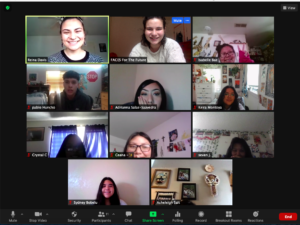
Currently, there are two cohorts of FACES scholars in Albuquerque. The seniors at HLHS & SVA have spent the first half of the year in workshops learning about COVID-19, Health Relationships and Boundary Setting, and health care pathways. Currently, these students are transitioning into online internships with Planned Parenthood of the Rocky Mountains, Albuquerque Health Care For the Homeless, and First Choice Community Health. Students will be reviewing online sex-ed classes and creating social media content for Planned Parenthood. At First Choice, Community Health students will have the opportunity to shadow individuals working as Community Health Workers and Medical Billers. These students will also be graduating from FACES in May. We have a new cohort of juniors from the Native American Community Academy. These students will be learning about personal wellness, public health, and health career pathways. These students will present a final project at the end of the year on a specific health issue in their community. Next year these students will participate in the regular FACES internship pending COVID-19.
San Francisco Seniors created “positive messages” to share with Preceptors back in October of 2020
These messages were intended to be a way to connect with our Industry Partners and remind them they are still at the forefront of our thoughts as they battle the Coronavirus Pandemic. All of these Seniors had the opportunity to participate in the Winter internship rotation, before the COVID-19 Shelter in Place order. (each student gave me permission to share).
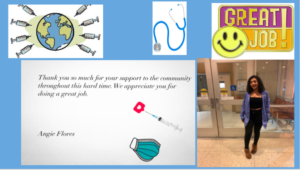 Angie Flores, Senior @ JOCHS
Angie Flores, Senior @ JOCHS
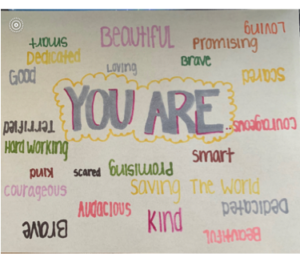 Federico Rangel, Senior @ JOCHS
Federico Rangel, Senior @ JOCHS
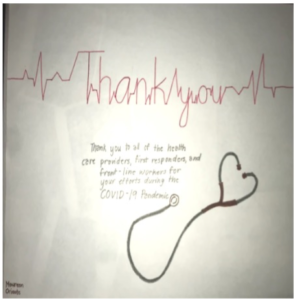 Maureen Oriente, Senior @ JOCHS
Maureen Oriente, Senior @ JOCHS
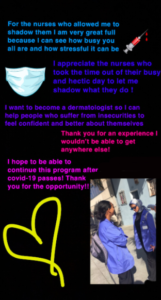 Raiyana Alam, Senior @ JOCHS
Raiyana Alam, Senior @ JOCHS
Mental Health workforce development
In November 2020, FACES held a focus group for 8 students from HBS, in partnership with our funders from SFDPH (Kimberly Ganade). Participants had the opportunity to learn about different career options while also providing very valuable data. The goal of the focus group was to gain insight into the barriers students of color may face as they work towards a degree in the Mental and Behavioral Health field. Student insight will be used towards the continued effort of building a strong workforce development pipeline for SF youth.
FACES Continues Pipeline Work with UCSF
One silver lining of sheltering in place has been finding innovative ways to continue serving FACES students. This Spring, FACES was set to pilot an internship and job-shadowing program in partnership with UCSF Pediatric Residents. When schools closed, the amazing team at UCSF helped us pivot this programming – coming up with a series of virtual workshops open to FACES students nationwide! So far, workshops have been attended by 100+ FACES students and have included a UCSF career panel, an interactive session using real-life medical case scenarios, and a COVID-19 Q&A. The FACES Team is grateful to the UCSF Pediatric Residents and staff who are helping to plan and implement these wonderful virtual pipeline events for the FACES Program!
FACES Hayward Students Show Their Support for St. Rose Hospital 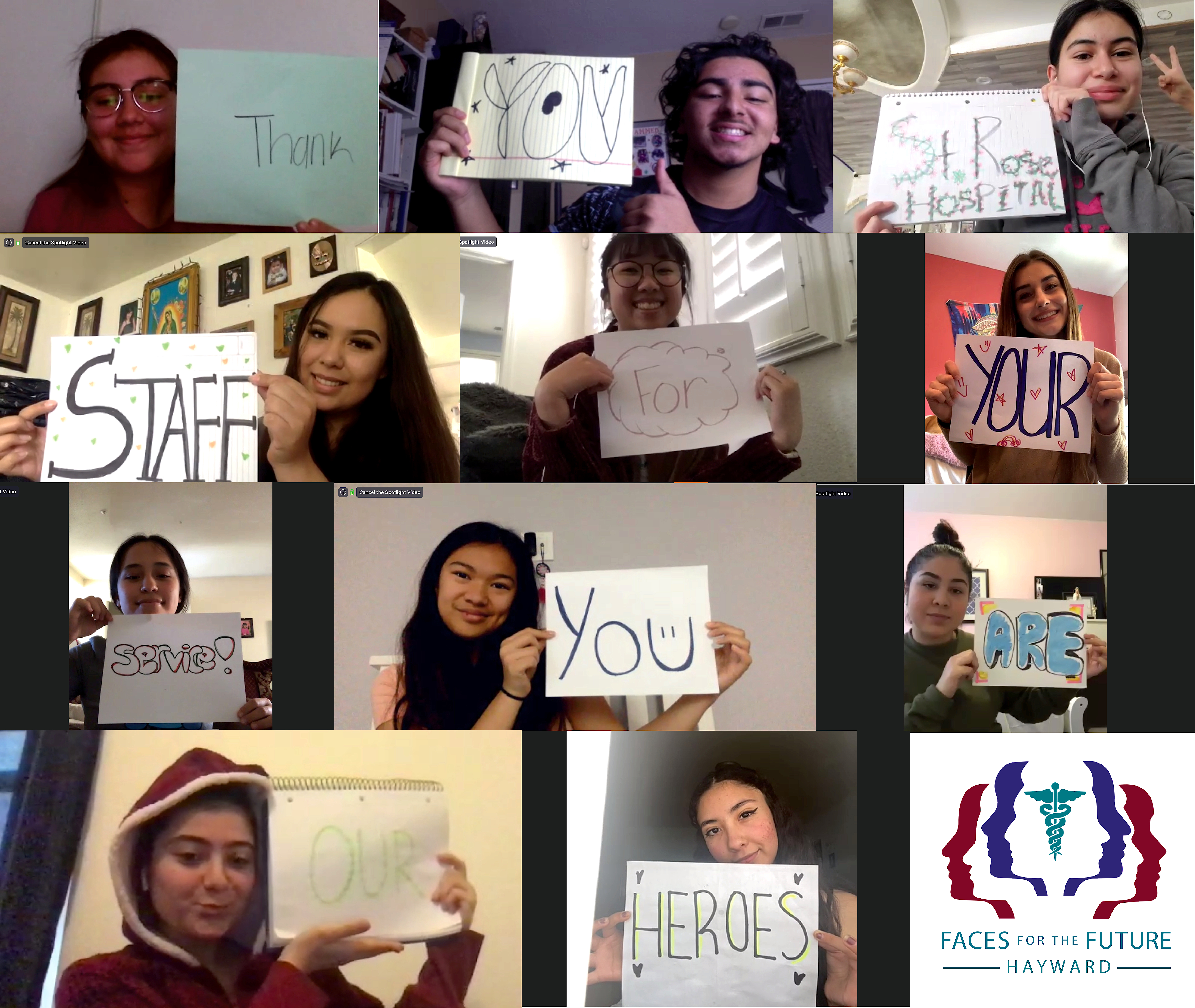
FACES Hayward students miss their internship supervisors at St. Rose Hospital! During this week’s Zoom workshop, students put together this special image to thank St. Rose Hospital staff.
FACES Sacramento Students Begin Hosting Trivia Thursdays!
For many FACES students, school closures mean that they’ve become caregivers for younger siblings, increased their hours at essential jobs, and continued to complete academic work, all while missing their friends and navigating the pandemic’s impacts on their families and communities. FACES Sacramento Program Coordinator Taylor Intermill came up with a fun way for students to escape the stress and spend some time socializing with their peers. Each Thursday, Taylor hosts an hour-long Zoom trivia game open to FACES students and program coordinators from all program locations. FACES Trivia Thursday is increasing in popularity, and enables students from Sacramento to engage in a little friendly competition with programs in San Francisco, Albuquerque, Denver, and more! Taylor says, “It’s a great way for students and staff to get their minds off of the everyday stress and negativity – plus, who doesn’t like a little competition?” Trivia Thursdays is just one of the strategies FACES is using to stay connected to students during school closures.
FACES Albuquerque Students Use Poetry to Gain Perspective
The FACES Albuquerque students had a workshop with Reina Davis and learned about poetry. Here are some words from Reina:
Poetry can be such an important tool for students during this time. Poetry allows for the expression of thoughts and experiences in a way where you can simultaneously process and portray them using YOUR narrative. This can give students a sense of autonomy and authority over their lives and over the articulation of their current circumstances. In this way, poetry can make students feel heard, even without an audience. Poetry is also an extremely accessible medium that requires a writing utensil and something to write on. This can be anything from a piece of scratch paper and a pen, a marker, and a napkin, or a laptop. It is also extremely accessible in terms of time availability. A poem can be written in 5 minutes, or less, and can be continued over a period of time if one so chooses. For students, it allows them a pressure-free way to take time to themselves and reflect on their days or write about fantastical things, or their love, or their joy or pain. This I feel is an act of self-care, and in the words of Audre Lorde, “an act of self-preservation” needed during this time.
The intention of this workshop was to allow students to take a break from the linear thinking often required in school and to think abstractly about the way they perceive the world. To do this, I had the students think of three emotions outside of “happy”, “mad”, or “sad”. I then had them apply the five senses to each emotion. What would that emotion taste as if it had a taste? After that exercise, I had the students think of the days of the week personified as people, or to apply the five senses to each day of the week. This allowed for the students to truly reflect on how they think of each day, and what influences those thoughts. Are their weeks the same? Why do they feel a specific way about a certain day? Controlling the narrative on how we portray our days, allows for students to gain autonomy on how they wish to articulate their lived experiences in their daily lives and to realize the power within that.
Read a poem that our FACES student Tala Abeita wrote here
Three-Part COVID-19 Workshop Series
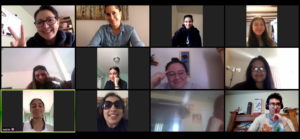 When the FACES team first heard that school closures were a possibility, we immediately got to work designing online workshops for our students to replace the usual in-person programming. The first workshops were a 3-part series on COVID-19. We thought the pandemic was an important learning opportunity for students – so they could understand what was happening in their lives and in the context of their interest in health.
When the FACES team first heard that school closures were a possibility, we immediately got to work designing online workshops for our students to replace the usual in-person programming. The first workshops were a 3-part series on COVID-19. We thought the pandemic was an important learning opportunity for students – so they could understand what was happening in their lives and in the context of their interest in health.
Workshops were entitled COVID-19 and the Public Health Response, Medical Ethics and Health Disparities During COVID-19, and Mental Health and Social Isolation During COVID-19. Through each workshop, students engaged in interactive learning and discussions about COVID-19, epidemiology, public health, and the pandemic’s impacts in their communities and nationwide. Students also completed lesson assessments after each workshop and had opportunities to connect with their program coordinators and peers about the immediate personal impact of the pandemic on their families.